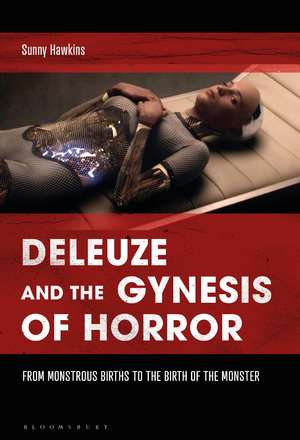Deleuze and the Gynesis of Horror: From Monstrous Births to the Birth of the Monster
Autor Sunny Hawkinsen Limba Engleză Paperback – 20 apr 2022
| Toate formatele și edițiile | Preț | Express |
|---|---|---|
| Paperback (1) | 196.54 lei 6-8 săpt. | |
| Bloomsbury Publishing – 20 apr 2022 | 196.54 lei 6-8 săpt. | |
| Hardback (1) | 655.42 lei 6-8 săpt. | |
| Bloomsbury Publishing – 30 sep 2020 | 655.42 lei 6-8 săpt. |
Preț: 196.54 lei
Preț vechi: 257.21 lei
-24% Nou
Puncte Express: 295
Preț estimativ în valută:
37.61€ • 39.37$ • 31.30£
37.61€ • 39.37$ • 31.30£
Carte tipărită la comandă
Livrare economică 31 martie-14 aprilie
Preluare comenzi: 021 569.72.76
Specificații
ISBN-13: 9781501369322
ISBN-10: 1501369326
Pagini: 202
Dimensiuni: 152 x 229 x 15 mm
Greutate: 0.28 kg
Editura: Bloomsbury Publishing
Colecția Bloomsbury Academic
Locul publicării:New York, United States
ISBN-10: 1501369326
Pagini: 202
Dimensiuni: 152 x 229 x 15 mm
Greutate: 0.28 kg
Editura: Bloomsbury Publishing
Colecția Bloomsbury Academic
Locul publicării:New York, United States
Caracteristici
Argues that Deleuze and Guattari's theories of radically affirmative, qualitative difference offer ways of understanding how horror might invoke "monstrosity" without reifying woman's "Otherness" in the phallocentric gender binary
Notă biografică
Sunny Hawkins is the Director of Peer Tutoring and Writing Across the Curriculum at Butler University in Indianapolis, USA, where she teaches seminars on Gender and Horror Film. She holds a PhD in English from Southern Illinois University Carbondale and has served as an Associate Professor of English at the University of Southern Indiana and Texas A&M University-Kingsville, USA. Her work on horror film has appeared in the interdisciplinary journal Reconstruction.
Cuprins
1. Mother, (m)Other2. Mother (of) Monsters3. Meet Your Makers4. It's a Monster (Baby)5. The Post-Human FamilyBibliographyIndex
Recenzii
This is a cutting-edge, truly significant work. In her unique and compelling application of Deleuzian "schizosophy" to modern horror, Hawkins claims to "push the embodied unthinking of the gender binary further in the field of feminist film theory, for the sake of both film theory and feminism itself," and indeed she does. Hawkins reminds us that we are "misshapen, half-formed creatures, full of desire," and convinces us that we need not experience that as a negative thing but rather as the beginning of our liberation from the repressive molar-ized world of modernity. Truly a triumph!
Situating her work on motherhood in the "interstitial" current moment when gender roles have been complicated and troubled but with no alternatives as yet articulated, Sunny Hawkins employs Deleuzian schizoanalysis to examine motherhood in horror films. Her work is provocative and useful for film and gender scholars, and her readings of specific films such as Alien, Frankenstein, Twilight, and Underworld give them new life.
Sunny Hawkins' excellent book is a valuable addition to the growing areas of Deleuze and feminist film theory and Deleuze and the horror film. Deleuze and the Gynesis of Horror returns to some important feminist critiques of the concepts of Woman, the feminine and sexual difference and recasts them using Deleuze's nonbinary understanding of difference. Hawkins' discerning and nuanced schizoanalytic readings of sexual difference, motherhood and the feminine in the horror film bring to life affective, molecular and rhizomatic film viewing experiences.
Situating her work on motherhood in the "interstitial" current moment when gender roles have been complicated and troubled but with no alternatives as yet articulated, Sunny Hawkins employs Deleuzian schizoanalysis to examine motherhood in horror films. Her work is provocative and useful for film and gender scholars, and her readings of specific films such as Alien, Frankenstein, Twilight, and Underworld give them new life.
Sunny Hawkins' excellent book is a valuable addition to the growing areas of Deleuze and feminist film theory and Deleuze and the horror film. Deleuze and the Gynesis of Horror returns to some important feminist critiques of the concepts of Woman, the feminine and sexual difference and recasts them using Deleuze's nonbinary understanding of difference. Hawkins' discerning and nuanced schizoanalytic readings of sexual difference, motherhood and the feminine in the horror film bring to life affective, molecular and rhizomatic film viewing experiences.
